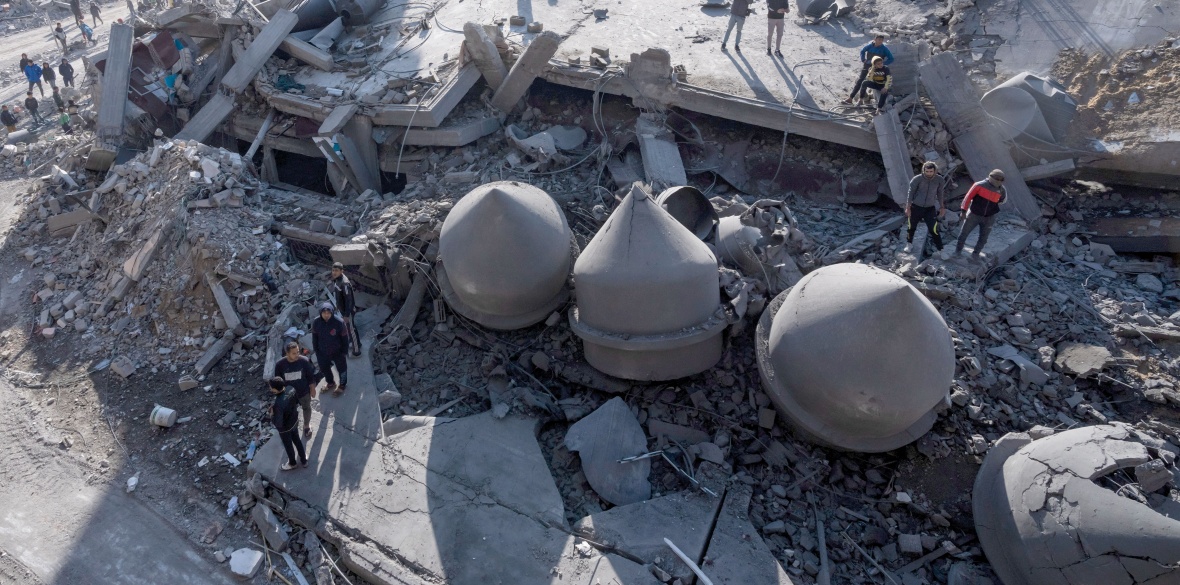This is the last article you can read this month
You can read more article this month
You can read more articles this month
Sorry your limit is up for this month
Reset on:
Please help support the Morning Star by subscribing here
ISRAEL’S genocidal action in Gaza has led to at least 30,000 dead (including 12,000 children). The past week has seen Israeli forces bombing Rafah — the last refugee haven in Gaza. But while the Israelis wage their ethnic cleansing campaign with bombs and bullets, they’ve also weaponised far more insidious means, including environmental destruction to make sure that no-one can return to a poisoned land.
Israeli armed forces are not just intentionally bombing residential areas in Gaza indiscriminately but are also using their sophisticated electronic surveillance technology to target the educated and skilled sections of Palestinian society, like academics, doctors, teachers, engineers. Only last week Israel killed Professor Nasser Abu al-Nour, a professor at the faculty of nursing at the IUG University in Gaza, along with seven members of his family in an attack on his home.
On top of this, and for the first time in the history of war, the Israelis are deliberately targeting journalists. In 2023 alone almost 100 journalists have been killed and 400 imprisoned, according to a report by the International Federation of Journalists. Israel does not want its war crimes documented.
Israeli tactics in Gaza remind me of the methods I saw used by the counter-revolutionary forces of Renamo in Mozambique in the aftermath of that country’s liberation from Portuguese colonial rule. Renamo was set up in 1977 by Rhodesian and South African security services. And although Israel has denied being involved, it is highly likely that it was, given the country’s close co-operation with the South African security services at the time. It has certainly learned from Renamo’s tactics. In order to undermine attempts by the revolutionary government under Samora Machel to stabilise and develop the country Renamo targeted the scarce educated and skilled workers in order to cause a complete breakdown of the social order.
It also sought to disrupt the nation’s economy and infrastructure by cutting railway and power lines, destroying roads and bridges, and sabotaging oil-storage depots. And in their raids on towns and villages, the guerillas sometimes engaged in the wholesale massacre of civilians. By the late 1980s, Renamo’s insurgency had caused at least 100,000 deaths and the creation of more than 1,000,000 refugees. Mozambique’s economy was brought to a standstill, and the government was unable to keep the country’s railroad network functioning. This is exactly what Israel is doing in Gaza today.
In a recent interview in Counterpunch, managing editor Joshua Frank details the weaponisation of such social destruction being carried out by the Israelis in the Palestinian territories.
He says that “since October 7, 29,000 air-to-surface munitions have been fired in Gaza, and 40 per cent of those were large, unguided bombs. Such bombs are meant to destroy and are indiscriminate. Seventy per cent of all homes in Gaza have been destroyed. There are no functioning hospitals left. Most of the schools have been destroyed.”
In his interview, he also talks about how this mass destruction of buildings has created terrible air pollution. “We know that Gaza is a testing ground for Western arms manufacturers,” he says. “We don’t know exactly what’s being used in some cases, but we know the impacts are horrific, and it will take decades to not only rebuild but to understand the true toll that this is taking on the region.”
There is also a huge environmental impact, he says, a historic decimation of olive groves, which are the cultural heritage of Palestinians, and in Gaza are a big part of the economy.
Olive trees make up 10 per cent of the Gazan economy, so by systematically destroying these groves the Israelis are aiming to destroy a viable Palestinian economy. This is environmental and economic warfare.
In Palestine as a whole, since 1967, Israel has uprooted 800,000 native olive trees. These trees are not monocrops. They are forests. They have many other trees in these groves, like buckhorn, hawthorn, almond trees, pine and fig trees. They form whole ecosystems, are home to many different types of birds. So these are forests that have been historically cultivated, but in the West Bank, they’ve been torn down to build settlements.
“Then,” he goes on, “there is the Israeli intention of flooding all the tunnels built by Hamas, primarily in the north. There’s precedent for the destruction that this caused. Egypt flooded tunnels about 10 years ago, and there’s a lot of documentation about what that flooding of seawater into those tunnels to destroy alleged Hamas smuggling routes did to agricultural lands.
“The aquifers are being completely polluted and destroyed. Even before October 7 in Gaza over 90 per cent of the water was contaminated in the drinking water supplies. The sewage systems in the Gaza Strip are completely broken.” Diarrhoea is also rampant and other waterborne illnesses are spreading.
Already in Gaza there has been a huge rise in cases of asthma and that has undoubtedly to do with the bombing and destruction of buildings, from the dust and toxins released into the air.
Today round 10 per cent of Gazans are dealing with asthma. I don’t think we even really have a true understanding of how bad the situation is there on a public health level.
With all the information we now have about Israel’s war on the Palestinians, it is not simply a question of determining whether war crimes are being committed and whether the actions taken against Palestinians can be characterised as genocide but documenting the extent of these crimes and demanding urgent action from the international bodies.










